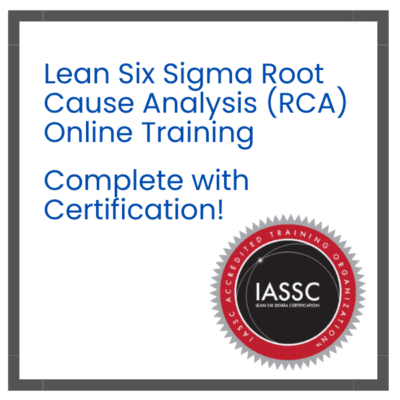A Lean Six Sigma Master Black Belt is an expert in process improvement who leads complex projects, mentors Black Belts and Green Belts, and drives organizational change. This role is critical in helping businesses achieve significant improvements in efficiency, reduce waste, and align initiatives with strategic goals.
Master Black Belts not only possess advanced knowledge of Lean and Six Sigma methodologies but also play a key role in training and coaching teams to deliver high-impact results.
Table of contents
Understanding Six Sigma and Its Belt Hierarchy
Before exploring the Master Black Belt, it’s important to understand the Six Sigma methodology. Six Sigma focuses on identifying and eliminating defects in processes to improve overall quality. It uses statistical tools and techniques to analyze and optimize business processes.
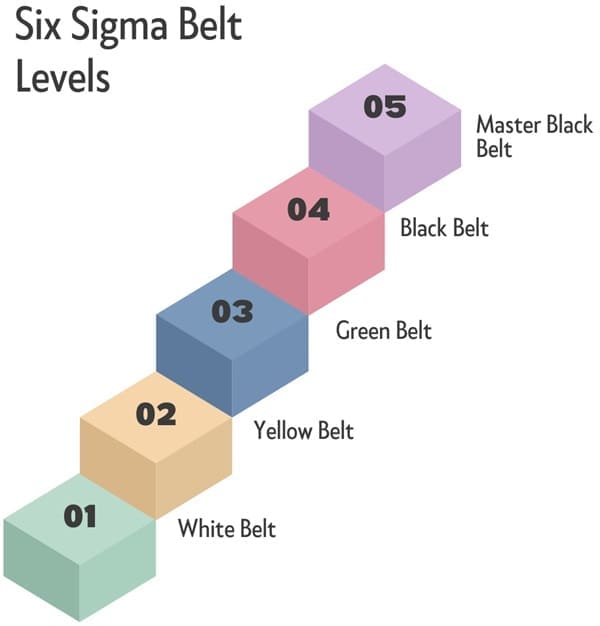
Six Sigma certifications are structured similarly to martial arts belts, indicating different levels of expertise:
- White Belt: Basic understanding of Six Sigma principles.
- Yellow Belt: Deeper knowledge, involved in specific project teams.
- Green Belt: Proficient in Six Sigma tools, leads smaller projects.
- Black Belt: Advanced expertise, leads larger projects, mentors Green Belts.
- Master Black Belt: Highest level, oversees Six Sigma strategy across the organization.
What is a Master Black Belt?
A Master Black Belt (MBB) is the pinnacle of Six Sigma certification. They are experts in the Six Sigma methodology and play a crucial role in driving continuous improvement within an organization. Master Black Belts are not just skilled practitioners; they are also leaders and mentors who guide other belts (Black Belts and Green Belts) and help integrate Six Sigma into the company’s culture and operations.
Roles and Responsibilities of a Master Black Belt
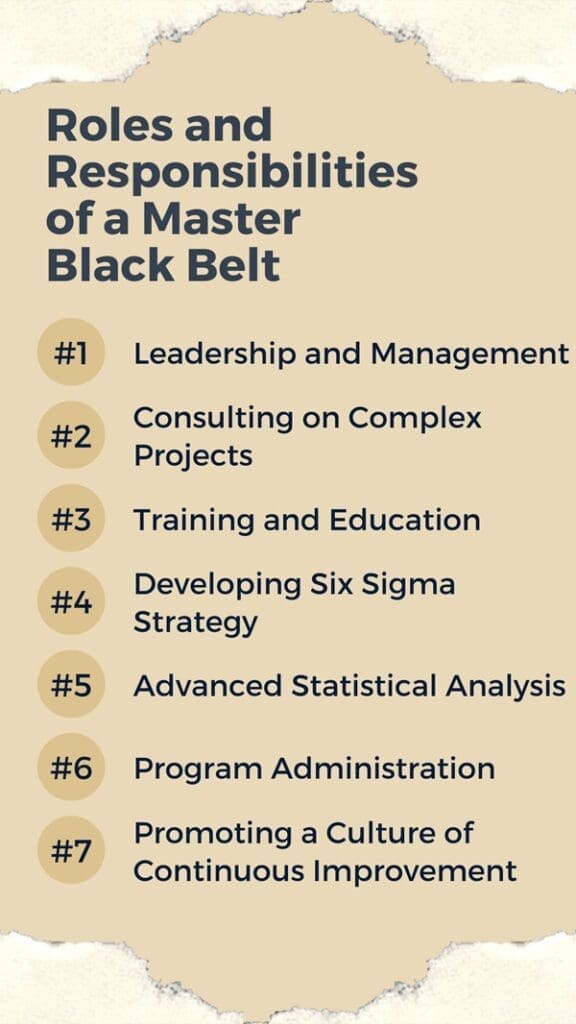
Master Black Belts have a broad range of responsibilities that go beyond executing projects. Their role is multifaceted, encompassing leadership, training, and strategic planning. Here are some of their key roles:
- Leadership and Management: Master Black Belts lead the Six Sigma program within an organization. They oversee the work of Black Belts and Green Belts, ensuring that projects align with the company’s strategic goals.
- Consulting on Complex Projects: They consult on the most challenging projects, providing expertise and guidance to solve complex process issues that require advanced statistical analysis and strategic thinking.
- Training and Education: Master Black Belts are responsible for training and mentoring other belts. They conduct training sessions, workshops, and seminars to educate employees about Six Sigma principles and tools.
- Developing Six Sigma Strategy: They help develop and implement Six Sigma strategies that drive organizational improvement. This includes identifying high-impact areas where Six Sigma can be applied effectively.
- Advanced Statistical Analysis: Master Black Belts possess deep knowledge of statistical methods and are proficient in using advanced tools to analyze data and improve processes.
- Program Administration: They manage the overall Six Sigma program, ensuring that it runs smoothly and delivers the desired outcomes. This includes maintaining documentation, tracking progress, and reporting results to senior management.
- Promoting a Culture of Continuous Improvement: Master Black Belts advocate for a culture of continuous improvement, encouraging all employees to seek ways to enhance quality and efficiency in their work.
Certification Process for Master Black Belt
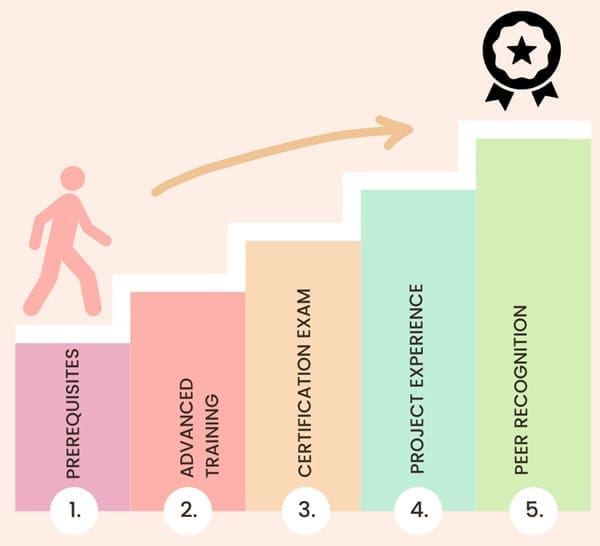
Becoming a Master Black Belt involves rigorous training and certification. The process typically includes the following steps:
- Prerequisites: Most certification programs require candidates to have a Black Belt certification and substantial experience in Six Sigma projects. This ensures that Master Black Belts have a solid foundation in Six Sigma principles and practical application.
- Advanced Training: Candidates undergo advanced training that covers complex statistical methods, leadership skills, and strategic planning. This training often includes coursework, workshops, and hands-on projects.
- Certification Exam: Many programs require candidates to pass a comprehensive exam that tests their knowledge and ability to apply Six Sigma concepts at a high level. The exam may include difficult statistical problems and scenario-based questions to assess how candidates handle various project situations.
- Project Experience: In addition to passing exams, candidates may need to demonstrate their expertise through successful completion of significant Six Sigma projects. This practical experience is crucial for proving their ability to lead and manage improvement initiatives.
- Peer Recognition: Achieving a Master Black Belt often involves gaining recognition from peers and Six Sigma leadership within the organization. This endorsement reflects the candidate’s expertise and commitment to the Six Sigma methodology.
Essential Skills for a Master Black Belt

Master Black Belts need a diverse set of skills to perform their roles effectively. These include:
- Technical Expertise: Master Black Belts have advanced knowledge of Six Sigma tools and techniques, including statistical analysis, process mapping, and quality management.
- Leadership and Management: They possess strong leadership skills, capable of guiding teams, managing projects, and driving organizational change.
- Communication Skills: Effective communication is crucial. Master Black Belts must convey complex ideas clearly and persuade stakeholders to embrace Six Sigma initiatives.
- Problem-Solving Abilities: They excel at identifying issues, analyzing data, and developing solutions to enhance process efficiency and quality.
- Training and Mentoring: Master Black Belts are adept at teaching and mentoring others, helping to build a knowledgeable and skilled workforce.
- Strategic Thinking: They can align Six Sigma projects with the broader goals of the organization, ensuring that improvement efforts support overall business objectives.
- Project Management: Master Black Belts manage multiple projects simultaneously, ensuring that they are completed on time and within scope.
Importance of Master Black Belts in Organizations
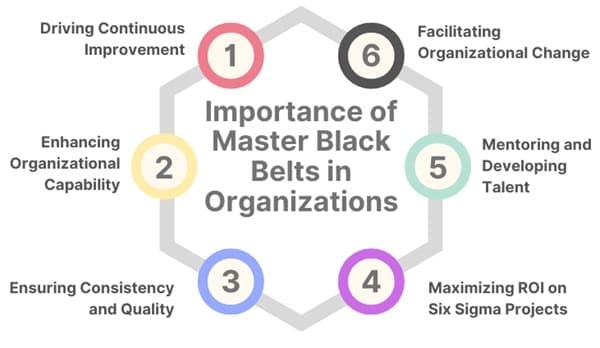
Master Black Belts play a vital role in the success of Six Sigma programs within organizations. Their expertise and leadership ensure that Six Sigma initiatives are effectively implemented and yield significant results. Here are some reasons why Master Black Belts are important:
- Driving Continuous Improvement: They lead the way in continuous improvement. This helps organizations stay competitive by enhancing processes and quality regularly.
- Enhancing Organizational Capability: Master Black Belts build Six Sigma capabilities within the organization. This creates a self-sustaining improvement culture to tackle future challenges.
- Ensuring Consistency and Quality: They oversee and standardize Six Sigma practices. This ensures quality improvements remain consistent across all departments and projects.
- Maximizing ROI on Six Sigma Projects: Their strategic oversight helps maximize returns on Six Sigma projects. They make sure efforts are directed toward high-impact areas.
- Mentoring and Developing Talent: Master Black Belts mentor other Six Sigma practitioners. This builds a skilled workforce that can sustain and expand improvement efforts.
- Facilitating Organizational Change: They guide through the complexities of organizational change. This ensures that Six Sigma methods are integrated smoothly and effectively.
How to Become a Master Black Belt?
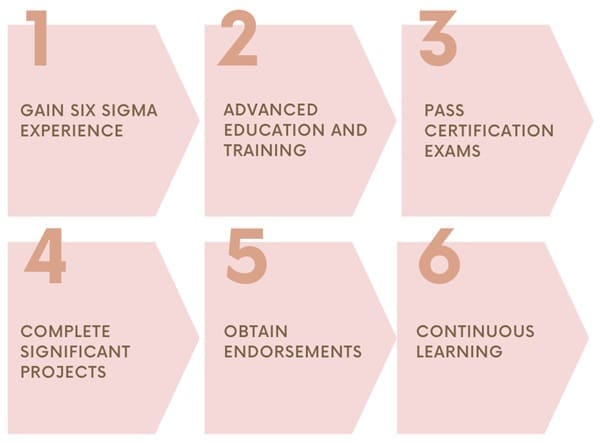
Becoming a Master Black Belt is a significant achievement that requires dedication and expertise. Here are the steps typically involved:
- Gain Six Sigma Experience: Begin by obtaining lower belt certifications, such as Green Belt and Black Belt. Build substantial experience by leading Six Sigma projects.
- Advanced Education and Training: Enroll in advanced Six Sigma training programs. These programs cover the comprehensive knowledge needed for Master Black Belt certification.
- Pass Certification Exams: Complete the required certification exams successfully. These exams test both your theoretical knowledge and practical application of Six Sigma principles.
- Complete Significant Projects: Show your ability to lead and manage large-scale Six Sigma projects. Focus on delivering measurable improvements through your work.
- Obtain Endorsements: Gain recognition from peers and Six Sigma leaders. This validates your expertise and commitment to the methodology.
- Continuous Learning: Keep updated with the latest Six Sigma practices. Improve your skills through ongoing education and professional development.
Challenges Faced by Master Black Belts
While the role of a Master Black Belt is highly rewarding, it also comes with its own set of challenges:
- Balancing Multiple Responsibilities: Master Black Belts often juggle multiple projects and responsibilities, requiring excellent time management and prioritization skills.
- Maintaining Expertise: Staying current with evolving Six Sigma tools and industry best practices demands continuous learning and adaptation.
- Navigating Organizational Politics: Successfully implementing Six Sigma initiatives often involves managing various stakeholders and navigating organizational politics to gain support and buy-in.
- Ensuring Project Success: Master Black Belts are accountable for the success of major improvement projects, which can be stressful and demanding.
- Mentoring Effectively: Providing effective mentorship to Black Belts and Green Belts requires patience, clear communication, and a deep understanding of individual learning styles.
Best Practices for Master Black Belts
To excel in their roles, Master Black Belts should adhere to best practices that enhance their effectiveness and impact:
- Foster a Collaborative Environment: Encourage teamwork and open communication to leverage the collective expertise of project teams.
- Promote a Culture of Continuous Improvement: Advocate for ongoing learning and improvement, inspiring employees to seek out and implement enhancement opportunities.
- Maintain Clear Documentation: Ensure that all Six Sigma processes, methodologies, and project outcomes are well-documented for consistency and future reference.
- Engage in Strategic Planning: Align Six Sigma projects with the organization’s strategic goals to ensure that improvement efforts contribute to long-term success.
- Develop Strong Communication Skills: Continuously work on improving communication skills to effectively convey ideas, lead meetings, and present findings to stakeholders.
- Emphasize Data-Driven Decision Making: Utilize data and statistical analysis to inform decisions, ensuring that project outcomes are based on solid evidence.
- Invest in Personal Development: Continuously seek opportunities for personal and professional growth to stay at the forefront of the Six Sigma field.
How do Organizations Benefit from Employing Master Black Belts?
Organizations that employ MBBs can better harness the full potential of Six Sigma methodologies. Some of the key organizational advantages include:
- Achieving Business Goals: MBBs align Six Sigma projects with the organization’s strategic goals. For example, they may focus on projects that reduce production costs or improve customer satisfaction, driving business results directly.
- Reduction in Operational Costs: By optimizing processes and reducing waste, MBBs help organizations save money. This can be especially valuable for industries with thin profit margins or high operating costs.
- Enhanced Customer Satisfaction: Improved processes often lead to better-quality products or services, which enhances customer satisfaction and loyalty.
- Employee Development: MBBs’ focus on training creates a culture of learning and development. Employees become more skilled, confident, and engaged, which can lead to higher retention rates and job satisfaction.
Future of Master Black Belts in Six Sigma
As organizations continue to prioritize quality and efficiency, the demand for Master Black Belts is expected to grow. Their ability to lead complex
process improvements, mentor other professionals, and drive strategic initiatives makes them invaluable assets in any business environment. With the increasing complexity of global markets and the need for agile and resilient operations, Master Black Belts will play an essential role in helping organizations navigate challenges and capitalize on opportunities.
Moreover, the integration of new technologies such as artificial intelligence, machine learning, and advanced data analytics with Six Sigma practices will further enhance the capabilities of Master Black Belts. They will need to adapt to these technological advancements, leveraging them to create more effective and efficient processes.
Final Words
A Master Black Belt represents the highest level of expertise within the Six Sigma framework. They are not only skilled in advanced statistical methods and process improvement techniques but also serve as leaders, mentors, and strategic advisors within their organizations. Master Black Belts drive the Six Sigma agenda, ensuring that continuous improvement is embedded in the organizational culture and that the company can achieve and sustain high levels of quality and efficiency.
By investing in the development of Master Black Belts, organizations can enhance their ability to tackle complex challenges, improve operational performance, and maintain a competitive edge in their industries. As the business landscape continues to evolve, the role of the Master Black Belt will remain crucial in fostering innovation, excellence, and sustainable growth.
Whether you are an aspiring Six Sigma professional aiming to reach the highest certification level or an organization seeking to implement effective process improvement strategies, understanding the significance and capabilities of a Master Black Belt is essential. Their expertise not only drives meaningful change but also cultivates a culture of continuous improvement that benefits the entire organization.
About Six Sigma Development Solutions, Inc.
Six Sigma Development Solutions, Inc. offers onsite, public, and virtual Lean Six Sigma certification training. We are an Accredited Training Organization by the IASSC (International Association of Six Sigma Certification). We offer Lean Six Sigma Green Belt, Black Belt, and Yellow Belt, as well as LEAN certifications.
Book a Call and Let us know how we can help meet your training needs.












